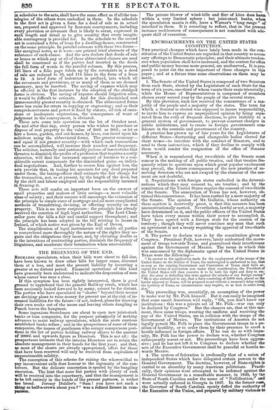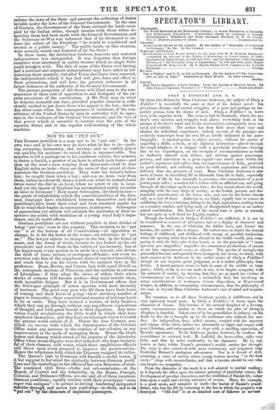ENCROACHMENTS ON THE UNITED STATES CONSTITUTION.
THE practical changes which have lately been made in the con- stitution of the United States are regarded in that country as neces. sary offerings to Democratic principles; and their ultimate tenden- cies when population shall have increased, and the contest for office and public money become more general, are unobserved. It is pro- posed to point out the more important of these changes in this paper ; and at a future time some observations on them may be made.
1. The Senate of the United States is composed of two Senators from each State, elected by the Legislature of each State for the term of six years, one-third of whom vacate their seats triennially; while the House of Representatives is composed of members chosen every second year by the people of the several states. By this provision, each law received the concurrence of a ma- jority of the people and a majority of the states. The term for which a Senator is elected was supposed to insure responsibility, to invite him to express an unprejudiced opinion by being sepa- rated from the evils of frequent elections, to give stability to a general system of government, to prevent constant changes in public institutions, and to create in foreign governments con- fidence in the councils and government of the country.
A practice has grown up of late years for the Legislatures of different States—fluctuating and changeable bodies elected for short terms—to interfere with the conduct of Senators, and to send to them instructions, which if they decline to comply with them would render the resignation of the office of Senator necessary. When it is remembered that two-thirds of the Senate must concur in the making of all public treaties, and that treaties fre- quently relate to questions upon which great popular excitement may prevail, the future consequences of the new practice of re- moving Senators who are not swayed by the clamour of the mo- ment are not doubtful.
2. Negotiations with foreign states embodied in the determi- nations which they may consent to, are treaties ; and by the constitution of the United States require the consent of two-thirds of the Senate. The annexation of Texas has not, however, ob- tained this concurrence. It has been carried by a mere majority of the Senate. The opinion of Mr. Gallatin, whose authority on these matters is deservedly great, is that this measure has been unconstitutionally carried. Nevertheless, lawful or not, a majority have determined on it, and the public officers of the United States have taken every means within their power to accomplish it. They have agreed with a foreign state for the cession of its territory ; though they will never convince any man that such an agreement is not a treaty requiring the approval of two-thirds of the Senate.
3. The power to declare war is by the constitution given to Congress. President Polk, however, lately authorized the move- ment of troops towards Texas, and guaranteed their interference against the Government of Mexico. The terms in which this was announced by the diplomatic agent of the United States in Texas were the following- " In answer to the application made for the employment of the troops of the United States on the frontier of Texas, the undersigned is authorized to say, that so soon as the existing Government and Convention of Texas shall have ac- cepted the terms of annexation now under their consideration, the President of the United States will then conceive it to be both his right and duty to em- ploy the army in defending this state against the attacks of any foreign enemy." "He is also authorized to say, that a force consisting of 3,000 men, placed on the border adjacent to Texas, will be prepared to act without a moment's delay within the territory of Texas, as circumstances may require, so as best to resist kora: sion."
This proceeding was, essentially, an assumption of the power to make war by Mr. Polk himself. But it can easily be imagined that some smart American will reply, " Oh, you don't know our institutions : this was a private act of Mr. Polk—war can only be declared by Congress." But the chances are, that at this mo- ment, these same troops, wearing the uniform and receiving the pay of the United States, are in collision with the troops of the Government of Mexico. The institutions of America do not legally permit Mr. Polk to place the Government troops in a po- sition of hostility, or to order them by their presence to exert a hostile influence in foreign affairs. If he can do so with impu- nity, Mr. Polk has the power to declare war, whether Congress subsequently assent or not. His proceedings have been aggres- sive ; and he has not left it to Congress to declare whether the acts of the Executive Government shall be peaceful or hostile to- wards Mexico.
4. The system of federation is professedly that of a union of independent States which have delegated certain powers to the General Government. The doctrine, however, of State-rights is carried to an absurdity by many American politicians. Practi- cally, their opinions were attempted to be enforced against the General Government in a remarkable manner, in 1833, by the State of South Carolina under the name of " Nullification," and were actually enforced in Georgia in 1827. In the former case, the Governor of South Carolina openly defied the authority of the Executive of the Union, and prepared by military violence to
enforce the laws of the State and prevent the collection of duties leviable under the laws of the General Government. In the case of Georgia, the Government of the State claimed the lands occu- pied by the Indian tribes, though treaties with those tribes re- specting them had been made with the General Government, and the Secretary-at-War was informed that if he attempted to en- force the orders of the President " he would be considered and treated as a public enemy." The public lands, on this occasion, were actually seized and disposed of by the State! In these cases, the distinction between domestic and national independence was disregarded. It was forgotten that foreign countries were interested in public treaties which no single State could interfere with. The fact of none of the States ever having had a national and separate independence may have aided in ter- minating these quarrels ; but after Texas shall have been annexed, the independence which it has had will give force and effect to State pretensions, and will have the greatest influence in all future defiances of the authority of the General Government.
The present prosperity of the States will blind men to the con- sequences of these acts of opposition to and disregard of the ex- press provisions of the constitution. A Mr. Polk may do what no despotic monarch can dare, provided popular clamour is suffi- ciently excited to put down those who appeal to the law ; but the day must come when the consequences of violations of the con- stitution of the United States by men in authority will be appa- rent in the weakness of the General Government, and the loss of that power which is essential to control over the acts of the separate States and to the regular well-working of the whole machine.



























 Previous page
Previous page